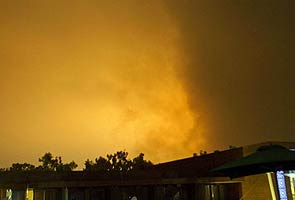My Blog List
Thursday, June 2, 2011
NATO carries out series of air strikes in Libyan capital
NATO blasted Tripoli with a series of air strikes early Thursday, sending shuddering booms through the city.
Ambulances, sirens blaring, could be heard racing through the Libyan capital after the rattling blasts. A NATO statement said the attacks hit military vehicle and ammunition depots, a surface-to-air missile launcher and fire control radar.
Libyan government officials refused repeated requests for information.
The air strikes rained down just hours after NATO and its partners said it would extend the Libyan mission for 90 more days in support of a rebel insurgency. The opposition is trying to oust Gaddafi, who has ruled Libya for more than 40 years. The rebels have taken control of much of eastern Libya,
* NDTVTwitter
* NDTVNDTV Social
* Share with MessengerLive Messenger
* NDTVGmail Buzz
* NDTVPrint
"This decision sends a clear message to the Gaddafi regime: We are determined to continue our operation to protect the people of Libya," said NATO Secretary-General Anders Fogh Rasmussen.
Extending the mission also reflects resiliency of the Gaddafi regime that is hanging on to power despite the NATO strikes that have targeted military sites and the ruling family since mid-March, a naval blockade and top defections from his government and military.
They included the Libyan oil minister Shukri Ghanem, who said in Rome on Wednesday that he now supports the rebel insurgency that have set up a de-facto capital in Benghazi.
"In this situation you can no longer work, so I have left my country and my work to unite myself with the choice of young Libyans to fight for a democratic country," the ANSA news agency quoted Ghanem as saying.
Ghanem said he left the regime two weeks ago and arrived in Rome on Tuesday. The Italian Foreign Ministry refused to comment. Up to now Libya has insisted that Ghanem was on a business trip.
Ghanem said Libya's oil infrastructure had been badly hurt by the war.
Up to now, oil and gas has accounted for 95 per cent of Libya's export income, 25 per cent of its gross domestic product and 80 per cent of government revenue, according to U.S. government statistics.
The defection followed the departure of eight top Libyan army officers, including five generals, who were presented to reporters in Rome earlier this week by the Italian foreign ministry days after they fled Libya.
Another 13 servicemen loyal to Gaddafi, including a colonel and four commanders, have fled to neighbouring Tunisia, the official Tunisian news agency reported. It was the second group of military men to defect to Tunisia this week.
Also Wednesday, a car exploded next to a hotel where foreign diplomats stay while visiting Benghazi, a rare attack in the Libyan rebels' de facto capital.
Jalal al-Gallal, a rebel spokesman, said the blast caused no injuries or deaths. The burning car sent plumes of black smoke into the air.
"It's a cowardly act," he said, adding that rebels assume it was carried out by Gaddafi loyalists.
The car explosion was the first attack of its kind in Benghazi since NATO started its bombing campaign in mid-March and helped drive government troops away from the city. Despite months of fierce conflict between rebel forces and Gaddafi's military, Benghazi has been calm.
A crowd gathered at the scene, shouting, "Libya is Free." Rebel forces tried to cordon off the protesters.
In Geneva, a report by the U.N. Human Rights Council charged that Gaddafi's forces have committed war crimes.
The 92-page report also found that rebel forces committed "some acts which would constitute war crimes."
The three-member panel based its finds on interviews with 350 people in government and rebel-held parts of Libya, as well as in refugee camps in neighbouring countries.
It concluded that government forces committed murder, torture and sexual abuses "as part of a widespread or systematic attack against a civilian population" before and during the conflict that started in February.
"Such acts fall within the meaning of 'crimes against humanity,'" the panel said.
It also found "many serious violations of international humanitarian law committed by government forces amounting to 'war crimes.'"
Subscribe to:
Post Comments (Atom)

No comments:
Post a Comment